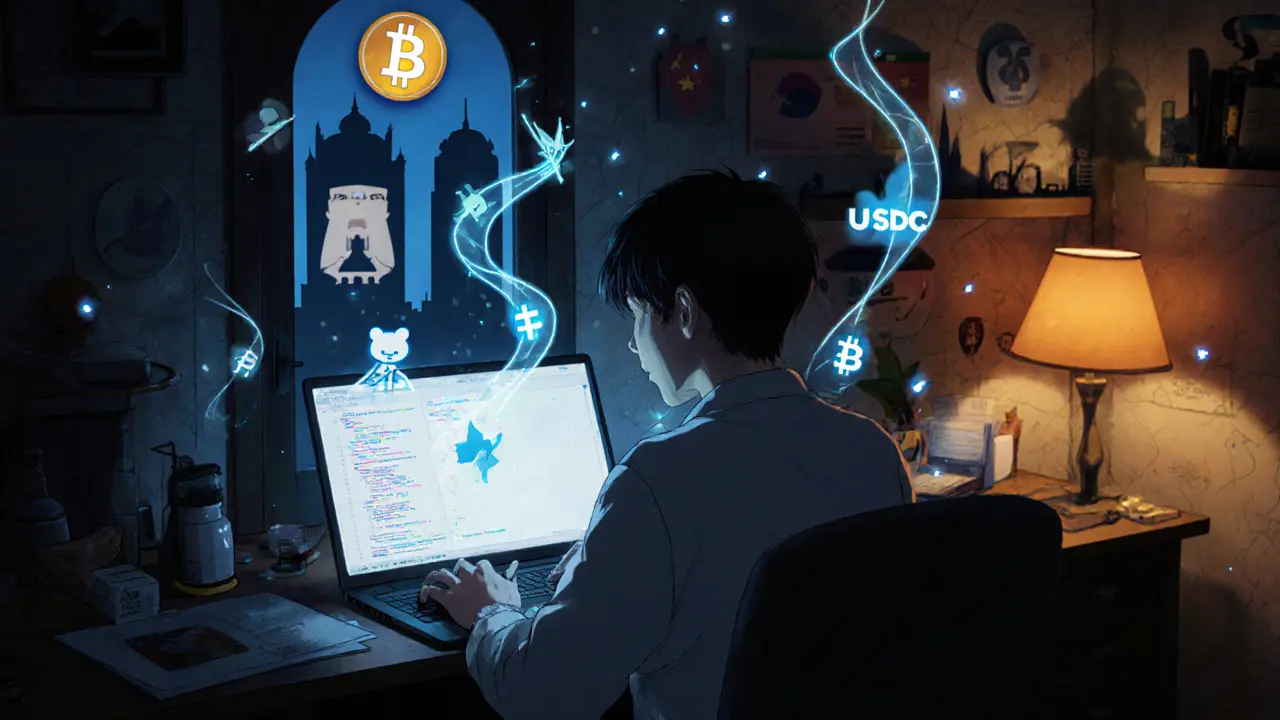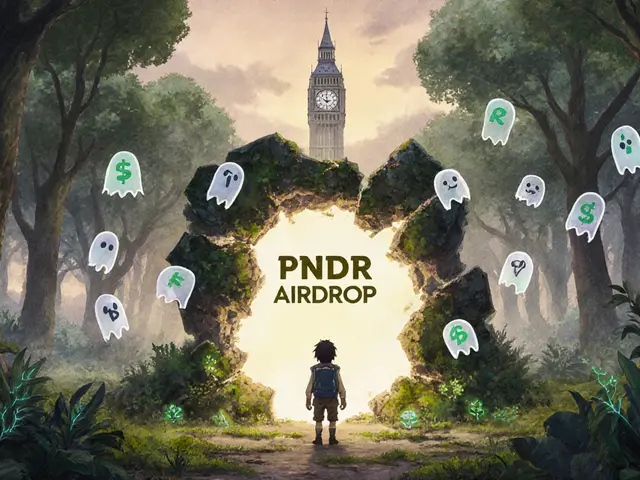OFAC Sanctions Checker
Check Sanctions Status
Enter a name, company, or crypto address to verify if it's on the OFAC sanctions list.
Enter a name or address to check OFAC sanctions status.
When the U.S. Treasury’s OFAC sanctions target North Korean cryptocurrency networks, the ripple effects are felt across every corner of the digital‑asset world. In the first half of 2025 alone, analysts at TRM Labs a blockchain‑analytics firm reported more than $2.1billion stolen by DPRK‑linked actors. This article breaks down what the sanctions cover, how the networks operate, who’s been named, and what you can do to stay safe.
Why the sanctions matter right now
North Korea’s regime relies on crypto theft to fund its ballistic‑missile and weapons‑of‑mass‑destruction programs. By choking off the revenue stream, the U.S. Department of Treasury the agency that administers OFAC hopes to limit the regime’s ability to buy parts, pay contractors, and purchase illicit services abroad.
- Revenue impact: Over $1million per year has been funneled from crypto theft into weapons programs since 2021.
- Global reach: The networks use Russian, UAE, and Chinese infrastructure to hide transactions.
- Legal risk: U.S. companies that inadvertently work with sanctioned actors can face civil penalties.
Key designations from the August272025 action
The most recent round of designations added six individuals and entities to the Specially Designated Nationals (SDN) list. Below is a quick snapshot.
| Entity / Person | Role in the Scheme | Primary Jurisdiction |
|---|---|---|
| Vitaliy Sergeyevich Andreyev | Facilitated crypto conversion for DPRK workers | Russia |
| Kim Ung Sun | Managed $600,000 in crypto‑to‑cash transfers | North Korea |
| Shenyang Geumpungri Network Technology Co., Ltd | Front company for laundering through Chinese exchanges | China |
| Korea Sinjin Trading Corporation | Supplied hardware for crypto‑mining farms | South Korea |
| Kim Se Un | Oversaw sanctions‑evasion logistics | North Korea |
| Jo Kyong Hun | Coordinated IT‑worker recruitment | North Korea |
How the crypto networks operate
The threat actors adopt a “dual‑purpose” model. They pose as legitimate freelancers on platforms like GitHub, Freelancer, and RemoteHub, then slip into real U.S. crypto firms. Once inside, they:
- Harvest private keys or API tokens from corporate wallets.
- Divert stablecoin payments (USDC, USDT) to self‑hosted wallets.
- Fragment the funds across dozens of addresses to thwart chain analysis.
- Use over‑the‑counter (OTC) brokers-some of which were themselves sanctioned in late2024-to convert crypto into cash.
Because many of these workers use recycled fake identities-names like “Joshua Palmer” or “Alex Hong”-the same persona can appear on multiple freelance sites, making detection harder.

Law‑enforcement response and asset seizures
The FBI the main federal investigative agency teamed up with the U.S. Department of Justice which filed a civil forfeiture complaint in June2025. The complaint sought more than $7.7million in crypto, NFTs, and digital assets linked to a laundering ring that operated inside U.S. crypto startups.
Seized assets included hundreds of thousands of USDC, several Ether (ETH) wallets, and high‑value NFTs depicting cyber‑punk art. The proceeds were traced back to senior DPRK operatives such as Kim Sang Man and Sim Hyon Sop.
What businesses can do right now
Even if you’re not a crypto exchange, you can still get hit by these schemes. Here’s a quick checklist:
- Screen every contractor: Run OFAC SDN checks on freelancers before granting wallet access.
- Monitor on‑chain activity: Use services like TRM Labs to flag addresses that have appeared in sanctions lists.
- Limit stablecoin exposure: Require multi‑factor authentication for any USDC/USDT transfers above $10,000.
- Audit code repositories: Look for hidden scripts that exfiltrate private keys.
- Educate staff: Run phishing simulations that mimic “payment request” emails from supposed freelancers.
Implementing these steps not only reduces the risk of a breach but also demonstrates due‑diligence if regulators ever ask.

Future outlook: what’s next for OFAC?
Officials say more designations are coming. The Treasury’s Office of Terrorism and Financial Intelligence (TFI) plans to expand the sanctions list to include additional front companies in Southeast Asia. Expect tighter reporting requirements for crypto‑businesses that handle “high‑risk” stablecoins.
In parallel, blockchain‑analytics firms are rolling out AI‑driven pattern detectors that flag “dual‑purpose” worker accounts the moment they appear on freelance sites. If you stay on top of those alerts, you’ll be ahead of the curve.
Frequently Asked Questions
What does it mean when OFAC sanctions a crypto address?
A sanction means any U.S. person is prohibited from dealing with that address. Banks, exchanges, and businesses must block transactions and report them to the Treasury.
How can I verify if a freelancer is on the SDN list?
Use the Treasury’s downloadable SDN CSV file or an API service that cross‑references names and known alias patterns (e.g., "Joshua Palmer").
Are stablecoins like USDC also subject to sanctions?
Yes. If a sanctioned wallet receives USDC, the transaction is blocked under the same rules as any other crypto asset.
What penalties can a U.S. company face for accidental violations?
Civil penalties can reach up to $250,000 per violation, plus possible disgorgement of ill‑gained profits.
How do the sanctions affect crypto exchanges based outside the U.S.?
Many exchanges voluntarily comply to avoid losing U.S. customers. Those that don’t risk being cut off from the global banking system.
Where can I find real‑time updates on new designations?
The Treasury’s OFAC website posts daily updates, and services like TRM Labs push alerts via email and webhook integrations.






Schuyler Whetstone
October 17, 2025 AT 08:22 AMThese OFAC moves finally prove the US ain’t gonna let NK’s crypto thievery run wild anyloner.
David Moss
October 23, 2025 AT 03:15 AMWow-another sanction, and yet the same shadow networks keep popping up, as if the whole system is rigged, you know? The real puppeteers are hidden behind the curtain, pulling strings from Moscow to Dubai, and we’re just the pawns, blindly following the headlines.
Pierce O'Donnell
October 28, 2025 AT 21:08 PMHonestly, these sanctions are just a PR stunt; the crypto world moves so fast that a few names on a list won’t stop a determined hacker.
Vinoth Raja
November 3, 2025 AT 16:02 PMThe architecture of the DPRK’s crypto laundering apparatus is a textbook case of asymmetric warfare in the digital domain.
By leveraging decentralized finance primitives, they obscure the provenance of illicit proceeds with a level of finesse that would make traditional financiers blush.
Smart contracts serve as automated mixers, routing funds through liquidity pools that rebalance in real time, thereby erasing traceability.
Moreover, the use of privacy‑enhancing tokens such as Monero or Zcash adds another cryptographic veneer that thwarts conventional blockchain analytics.
From a geopolitical standpoint, this translates into a strategic asset for the regime, funding missile development while evading sanctions regimes.
The recent OFAC designations target not just the front companies but also the underlying protocol layers that enable cross‑chain atomic swaps.
In practice, this means that every time a US‑based exchange processes a stablecoin deposit, it becomes a potential conduit for sanctioned assets.
Regulators must therefore adopt a multi‑vector monitoring framework, combining on‑chain heuristics with off‑chain entity risk scoring.
Artificial intelligence models can now detect anomalous transaction patterns, such as rapid fragmentation followed by aggregation in a foreign jurisdiction.
Nevertheless, adversaries adapt quickly, deploying custom obfuscation scripts that mimic benign DeFi activity.
Hence, a static blacklist is insufficient; dynamic threat intelligence feeds are essential to maintain operational relevance.
The collaboration between law‑enforcement and private analytics firms exemplifies a public‑private partnership that can outpace the attackers.
Yet, the legal implications for US entities remain fraught with uncertainty, especially regarding due‑diligence obligations.
Compliance teams should embed continuous monitoring into their risk management lifecycle rather than treating sanctions as a one‑off checklist.
Only through such holistic vigilance can the financial ecosystem hope to blunt the funding pipeline that sustains the North Korean war machine.
DeAnna Brown
November 9, 2025 AT 10:55 AMCan you believe they finally put those traitors on the list? This is a massive win for America’s security, and we should all be proud that our Treasury is stepping up to protect our nation’s interests!
Ikenna Okonkwo
November 15, 2025 AT 05:48 AMIndeed, it’s a hopeful sign that collaborative international pressure can curtail illicit finance, and it reminds us that persistence in policy can yield tangible results for global stability.
Jessica Cadis
November 21, 2025 AT 00:42 AMFrom a cultural perspective, targeting these crypto fronts also sends a message that illicit financial cultures won’t be tolerated, reinforcing global norms of ethical tech use.
Sara Stewart
November 26, 2025 AT 19:35 PMTotally agree-by integrating compliance APIs and automating SDN screening, firms can embed that cultural signal directly into their dev pipelines, making ethical tech the default.
Laura Hoch
December 2, 2025 AT 14:28 PMIt’s heartbreaking to think of the human cost behind these numbers, but by shining a light on the mechanisms, we empower the community to act with compassion and resolve.
Kaitlyn Zimmerman
December 8, 2025 AT 09:22 AMFor anyone looking for concrete steps, start by pulling the OFAC CSV daily and integrating it with your CI/CD pipeline to block prohibited addresses before code hits production
Chris Morano
December 14, 2025 AT 04:15 AMLet's keep the conversation constructive and focus on shared solutions that strengthen cybersecurity across borders
Deepak Kumar
December 19, 2025 AT 23:08 PMGreat point! I’d add that running regular phishing drills and simulating fake freelancer requests can boost your team’s awareness and keep attackers at bay!
Matthew Theuma
December 25, 2025 AT 18:02 PMWow, the crypto world never stops evolving 😅. Just gotta stay chill and keep an eye on those compliance updates.